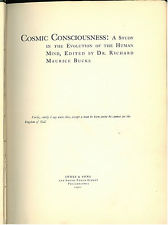Synopsis
In Cosmic Consciousness, Bucke stated that he discerned three forms, or degrees, of consciousness: simple consciousness, possessed by both animals and mankind; Self-consciousness, possessed by mankind, encompassing thought, reason, and imagination, and Cosmic consciousness, which is "a higher form of consciousness than that possessed by the ordinary man" According to Bucke, "This consciousness shows the cosmos to consist not of dead matter governed by unconscious, rigid, and unintending law; it shows it on the contrary as entirely immaterial, entirely spiritual and entirely alive; it shows that death is an absurdity, that everyone and everything has eternal life; it shows that the universe is God and that God is the universe, and that no evil ever did or ever will enter into it; a great deal of this is, of course, from the point of view of self consciousness, absurd; it is nevertheless undoubtedly true."
Reception
Moores said that Bucke's cosmic consciousness is an interconnected way of seeing things "which is more of an intuitive knowing than it is a factual understanding". Moores pointed out that, for scholars of the purist camp, the experience of cosmic consciousness is incomplete without the element of love, "which is the foundation of mystical consciousness". Juan A. Herrero Brasas said that Bucke's cosmic consciousness refers to the evolution of the intellect, and not to "the ineffable revelation of hidden truths". According to Brasas, it was William James who equated Bucke's cosmic consciousness with mystical experience or mystical consciousness. Gary Lachman notes that today Bucke's experience would most likely be explained by the "God spot", or more generally as a case of temporal lobe epilepsy, but he is skeptical of these and other organic explanations.
This page is based on this
Wikipedia article Text is available under the
CC BY-SA 4.0 license; additional terms may apply.
Images, videos and audio are available under their respective licenses.
